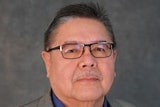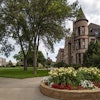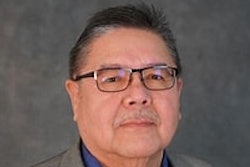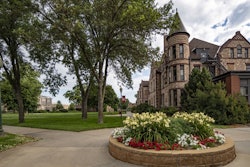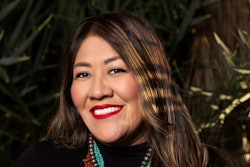Getting to Know Dr. Denise Askin
American Indian literature classes are not plentiful at U.S. colleges and universities, to say the least. But Dr. Denise T. Askin, an English professor at Saint Anselm College in Manchester, N.H., is devoted to the subject and is trying to keep it alive in her fall semester class, “Native American Voices.” Although she isn’t American Indian, Askin has been teaching the class for three years.
“Many of the Native American writers we study stress the importance of story to the survival of the people,” she says. “The story and storyteller keep all that is sacred and mean-ingful alive for the people. I ask the students to think about the role of story in their own lives and culture, and to think about what is lost when the storytellers are silenced. It is a powerful lesson in the endurance of the human spirit.”
The 40 students in Askin’s class will read the work of American Indian writers and explore the variety of ways the writers interpret the theme of loss in American Indian culture. Askin is also examining the rise of American Indian casinos, medicinal issues among American Indians and the Indian Removal Act of 1830. In 2005, 2.9 million people identified themselves as American Indian or Alaskan Native.
Two former students in Askin’s class were so moved by the plight of American Indians that they volunteered to work on the Pine Ridge Reservation in South Dakota, a reservation the size of Rhode Island but with few government services. The severe poverty and alcoholism came as a shock to the students, Askin says. After graduation, the students plan on returning to the reservation to work and help the tribe. Askin believes that the problems on the reservation stem not from the people, but from a lack of resources.
“Conditions on the re-servation are leading to despair. The law enforce-ment funding has been cut severely, there is only one fire house,” she says. “The economic, social and health problems are severe. There is no work for the young people. Education and health care are not adequate. But the Lakota spirit continues in their powwows. They are noted for their dancing, and there are increased efforts to teach
the children the traditional ways.
Our students came back genuinely transformed by the experience.”
Since the introduction of Askin’s course, which had been the only
course focused on American Indians offered at the Catholic college, an American Indian arts course has been introduced and an American Indian history course is being considered.
Three books Askin uses in her course:
Ceremony by Leslie Marmon Silko, Penguin, 1986: This book follows a young American Indian as he returns from World War II. How he copes with his people, maintaining the culture, alcoholism and the pains of war offer intense and compelling insight into American Indian issues.
The Lone Ranger and Tonto Fist Fight in Heaven by Sherman Alexie, Grove Press, 2004: This collection of 22 short stories based on the Spokane Indian Reservation is often humorous and insightful. It views American Indian lives from a contemporary standpoint and addresses the issues facing reservation life today.
Deer Woman, From Nothing But the Truth: An Anthology of Native American Literature by Paula Gunn Allen, Prentice Hall 2001: A short story that focuses on the oral tradition of Native people.
— By Nicole Roberge
© Copyright 2005 by DiverseEducation.com
